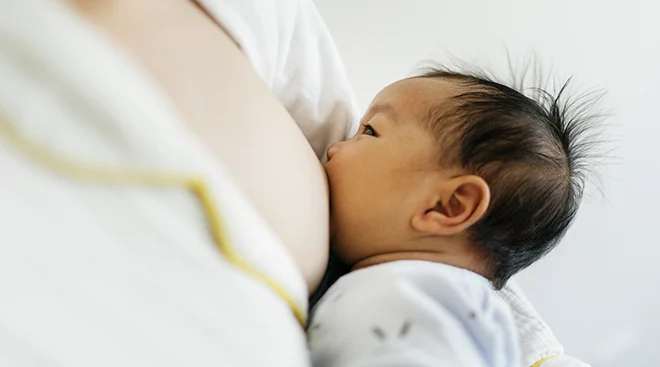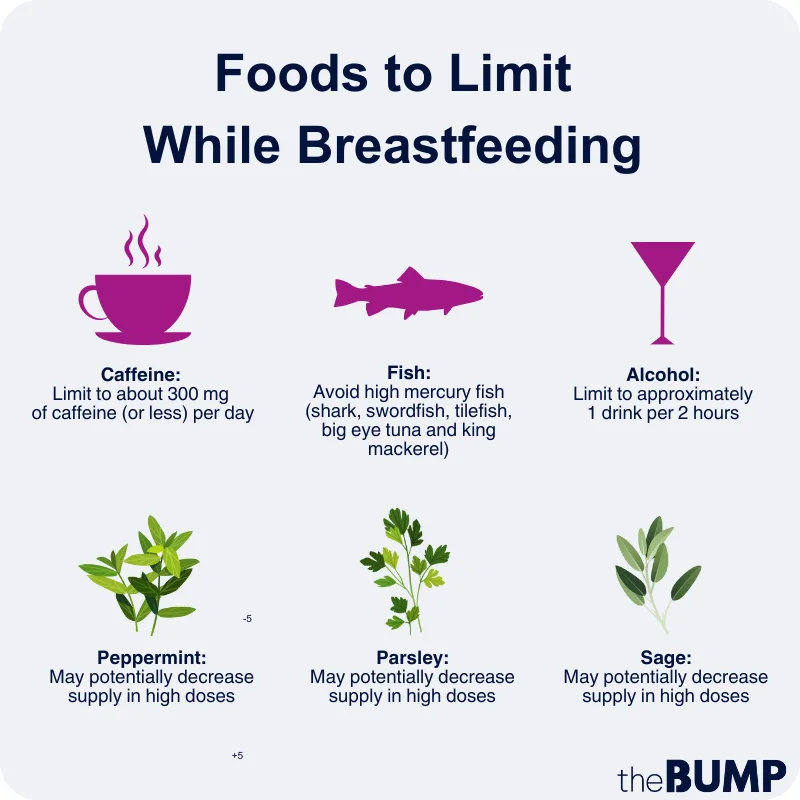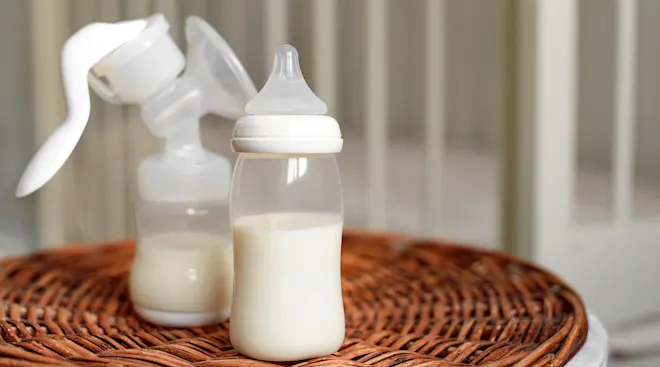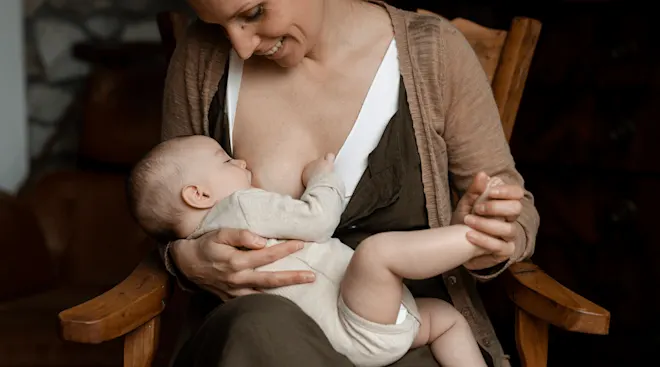Are There Foods to Avoid While Breastfeeding?
For nine months, you carefully avoided deli meat, hot dogs and unpasteurized cheese (and all the other non-pregnancy-friendly foods) to keep baby safe and healthy. Of course, now that baby is finally here, those protective instincts are probably heightened—so it’s normal to wonder if there are foods to avoid while nursing. After all, molecules from the food you eat can make their way through your breast milk and into baby’s system. But here’s the good news: There really isn’t a definitive list of foods to avoid while breastfeeding.
“There are actually zero foods that every breastfeeding woman should avoid completely. Most breastfeeding moms can continue to eat the foods they normally do,” says Lindsey Shipley, RN, a childbirth educator, IBCLC-certified lactation consultant and founder of Lactation Link, an online resource for breastfeeding education. “Moderation is important here, just like at any other time of your life. A well-balanced diet is important to help both you and baby feel your best.”
While there may not be a strict list of breastfeeding foods to avoid completely, there are a few things you may want to cut back on while nursing to keep your milk production levels up and ensure baby is happy and healthy. Read on to learn which foods to limit when breastfeeding, and how much of these foods is safe to consume.
Breastfeeding moms don’t need to stress too much about what not to eat while breastfeeding—but it’s important to be aware of the foods that, when consumed in large quantities, can affect baby’s health and impact milk supply. Here’s a breakdown of the foods to partially avoid while nursing, and why.
Alcohol
After nine months of no drinking, you’d probably like to have a beer or glass of wine—and that’s totally fine. But keep in mind that alcohol can pass through breast milk into baby’s system. “You can have alcohol, but assess yourself afterward. If you feel too inebriated to drive, walk around or act normally, you shouldn’t breastfeed,” says Andrea Syms-Brown, IBCLC, RLC, a New York City-based lactation consultant. “Pumping and dumping does nothing: It removes the milk but the alcohol levels are still high in your blood.” If you’ve had even a bit too much, wait until the alcohol has cleared your body before breastfeeding. By the time your blood is free of alcohol, your milk will be too.
Of course, how much alcohol it would take to make you tipsy—and how long you’d need to wait before you’re sober again—varies from person to person, based on their weight, metabolism and other individual factors. But it’s generally safe to breastfeed after having one alcoholic drink (5 ounces of wine, one shot of alcohol or 12 ounces of beer), according to the American Academy of Pediatrics (AAP). The org recommends having that drink after a breastfeeding session, if possible, and then wait two hours before your next nursing session so your body has time to clear the alcohol. (You can also plan to pump before drinking to have some expressed breast milk on hand.)
Of course, keep in mind that these guidelines are generalized. Leigh Anne O’Connor, IBCLC, a lactation consultant based in New York City with over 20 years of experience, emphasizes that if you’re sober enough to drive, you’re sober enough to breastfeed. Nicole Peluso, IBCLC, a lactation consultant and manager of lactation services and education for Aeroflow Breastpumps, adds that it can sometimes be difficult to tell if you’re impaired, so these more practical guidelines serve to help you navigate.
Caffeine
If you need a jolt after all those late nights you’ve been spending with baby, here’s the good news: Breastfeeding and coffee don’t have to be contrary terms. Caffeine is okay to consume while breastfeeding in moderate doses. So go ahead and enjoy your morning coffee, an afternoon tea or even the occasional soda. As long as you limit your caffeine intake to no more than three cups of caffeinated beverages per day (about 300 milligrams or less per day, per the CDC), you and baby will be just fine. Wondering if you can nurse after your morning coffee? While things containing caffeine aren’t necessarily foods to avoid while breastfeeding, some experts say it’s a good idea to enjoy your coffee or tea after a nursing session is finished. Like alcohol, caffeine passes into your bloodstream and into your breast milk, so having too much java could make some babies (especially newborns) jittery. By the time baby’s next feeding rolls around, the caffeine should be out of your system. However, Peluso and O’Connor reiterate the importance of listening to your body and baby, as everyone responds to caffeine differently. “I think it is important to urge nursing mothers to really tune into themselves and their babies when taking in caffeine,” Peluso says. “Some newborns are more sensitive to caffeine, so moms should watch for irritability and wakefulness after nursing sessions.”
When it comes to consuming chocolate and breastfeeding, you don’t have to worry. “Chocolate has a very low amount of caffeine, so you should feel comfortable enjoying a bar of chocolate,” says Tamara Hawkins, FNP, RN, IBCLC, a New York City-based lactation consultant and former president of the New York Lactation Consultant Association.
Fish
Virtually all fish contain some mercury, a common pollutant that’s a known neurotoxin, meaning it can affect baby’s brain. But most of the time, the health benefits of eating fish (high protein, low fat) outweigh the risk. “In particular, omega-3 fatty acids and vitamin D are essential for infant development,” Peluso says. Most fish, after all, only contain trace amounts of mercury, and breast milk does filter some of it out, O’Connor adds. The exceptions—and the fish that are labeled as foods to avoid while breastfeeding, according to the CDC—are shark, swordfish, tilefish, big eye tuna and king mackerel. These older, bigger, top-predator fish contain the highest levels of mercury, which can pass to baby through your breast milk. On the other hand, eating 8 to 12 ounces (that’s about two to three meals) per week of fish that have lower mercury levels, such as shrimp, salmon, pollock and catfish is a great way to enhance your breastfeeding diet. Wondering if sushi is okay to eat while breastfeeding? Peluso says that as long as you’re avoiding fish high in mercury, your favorite rolls can stay on the menu. “If a mom has a balanced diet and is regularly eating other sources of protein, mercury content might not be something she needs to worry about,” she says.
Peppermint, Parsley and Sage
These three herbs are what’s known as anti-galactagogues, meaning that—in high doses—they’ve been said to potentially decrease breast milk production. “There’s truth to that, but you’d need to eat so much sage, you’d have to eat a sage sandwich,” Hawkins says. “That sage-seasoned turkey sandwich or cup of peppermint tea isn’t going to reduce a mom’s milk supply. That said, Peluso reiterates that every body responds to things differently. “It’s important to tune into [your] milk supply to see if [you] notice a dip,” she says. If you’re looking for an alternative to peppermint tea, O’Connor recommends chamomile.
Alongside herbal teas, you might be wondering if herbal supplements are safe for breastfeeding moms (particularly to increase milk supply). O’Connor says that while there are some herbs that have been known to work as galactogogues, their effects will vary from person to person. Instead, both she and Peluso note that instead of relying on herbal supplements, breastfeeding moms should work with their providers and a lactation consultant to understand the root cause of decreasing or low supply. “There are many herbal options and some are contraindicated if Mom has certain health problems,” Peluso adds. “Chatting with a lactation expert on Mom’s specific health concerns can ensure that herbs are tailored to her specific situation.”
You may have heard a rumor that strongly flavored things—such as garlic or spicy dishes—are among the foods to avoid while breastfeeding, but there aren’t any hard and fast rules about the tastes you can enjoy. After all, how you flavor your food depends largely on your cultural cuisine. Somewhere in the world, a breastfeeding mom is eating a garlicky or spicy dish, and her baby is just fine.
In fact, exposing baby to different tastes might even make your child more open to flavors later on. “Studies show that some of the flavor compounds in the foods a breastfeeding mom eats show up in her milk within one to two hours,” Shipley says. “But rather than making babies fussy, this seems to give babies a preview of the tastes they’ll experience when they start solid foods. Babies are more likely to accept and enjoy new solid foods when they’re exposed to a wide variety of tastes through breast milk.”
Here’s the deal with eating spicy foods and garlic while breastfeeding:
Spicy Foods
Spicy foods and breastfeeding can go hand-in-hand without a hitch, Hawkins says. But this is where cultural traditions and personal habits come into play. “If you ate spicy foods throughout your pregnancy, baby is primed for those flavors,” she says. For some babies, spicy food doesn’t bother them at all. For others who are less accustomed to the taste, they might not enjoy it. “Just don’t have an out-of-the ordinary spicy meal. If you ate something spicy and baby is responding in a not-so-pleasant way, then maybe spicy foods could be the cause.” If that’s the case, just cut back on the spice.
Garlic
Garlic does flavor a mother’s breast milk, and some say the taste of it can turn baby off. But when it comes to garlic and breastfeeding, how baby reacts can depend on how accustomed they are to the taste. “If you’re someone who ingests a lot of garlic and had it during your pregnancy, chances are baby is going to enjoy it,” Syms-Brown says. In fact, one study suggests that babies who haven’t been exposed to garlic actually nurse for longer periods of time, apparently finding the new flavor extra-delicious.
If you were dealing with gas during pregnancy, your doctor may have suggested staying away from certain foods known to cause gas, such as beans, cauliflower and cabbage. So a lot of moms logically wonder what foods to avoid when breastfeeding a gassy baby. But the truth is, foods can make baby gassy only if they have specific sensitivities to them.
When a breastfed baby has a food sensitivity or allergy, the molecules from whatever Mom ate make their way through her breast milk into baby’s digestive system, where they irritate the lining of baby’s gut and cause pain, Hawkins explains. Of course, food sensitivities are specific to each child, but there are some common culprit foods, including:
- Dairy
- Soy
- Gluten
- Eggs
- Peanuts and tree nuts
- Citrus
- Fish
But while these foods are most likely to be the problem, moms shouldn’t treat them as foods to avoid while breastfeeding—at least not right off the bat. “The best way to find out [if baby has a sensitivity] is by exposing them to different foods,” Syms-Brown says. So how do you know if your child does in fact have a food sensitivity? Babies typically develop telltale symptoms within 12 to 24 hours after eating, Syms-Brown says, including:
“If baby is showing these symptoms, there’s a high chance that there’s a family history of allergies,” Shipley says. “Cow’s milk is the most common allergen for babies and seems to be more likely to cause problems for babies who were given formula in their first few days of life, because this early exposure to cow’s milk-based formula sensitizes their immature digestive systems.”
If you suspect baby is reacting to something you’ve eaten, the next course of action is usually to eliminate that food completely from your diet for two to three weeks and see if it makes a difference. Before you start an elimination diet on your own, though, it’s best to bring your concerns to your pediatrician to confirm that baby’s distress isn’t being caused by something else.
At the end of the day, remember: Unless certain foods have been flagged as a problem for your child, there’s no definitive list of foods to avoid while breastfeeding. “We try to make nursing as easy as possible from the start, because it’s hard enough as it is,” Hawkins says. So instead of stressing about which breastfeeding foods to avoid, focus on what you should eat: A colorful, varied diet full of nutrient-rich foods.
O’Connor echoes this sentiment: “There’s so many nuances, and if you put all these rules, then people are less likely to breastfeed. People should enjoy the food they like.” Her advice to breastfeeding moms? Use caution when it comes to old wives’ tales, reach out to providers with any questions and listen to your body and baby.
Please note: The Bump and the materials and information it contains are not intended to, and do not constitute, medical or other health advice or diagnosis and should not be used as such. You should always consult with a qualified physician or health professional about your specific circumstances.
Plus, more from The Bump:
Tamara Hawkins, FNP, RN, IBCLC, LCCE, CHHC, is a registered nurse and lactation consultant in New York City. She has over twenty years of experience as a maternity nurse and family nurse practitioner. Hawkins currently serves as director of Stork and Cradle, a prenatal education group offering childbirth classes and lactation consultation, as well as the former president of the New York Lactation Consultant Association.
Leigh Anne O’Connor, IBCLC, LCCE, is a board-certified lactation consultant based in New York City with over 20 years of experience. She has served on the Board of the New York Lactation Consultant Association and has been an accredited La Leche League Leader for over two decades. O’Connor is also a Lamaze Certified Childbirth Educator.
Nicole Peluso, IBCLC, CD, CAHPE, is a board certified lactation consultant, parenting educator, birth and postpartum doula, La Leche League Leader and manager of lactation services and education for Aeroflow Breastpumps. She has been in the field of lactation for over 20 years and is the mother of four children.
Lindsey Shipley, RN, IBCLC, is a labor and delivery nurse, childbirth educator, lactation consultant and founder of Lactation Link, an online resource for breastfeeding education.
Andrea Syms-Brown, IBCLC, RLC, is a New York City-based lactation consultant and newborn care educator with more than thirty years of experience. She has previously served as president and education director of the New York Lactation Consultant Association.
U.S. Food and Drug Administration, Safe Food Handling, February 2022 Healthy Children (American Academy of Pediatrics), Alcohol and Breast Milk, July 2020
Centers for Disease Control and Prevention, Maternal Diet, May 2022
Centers for Disease Control and Prevention, Breastfeeding and Special Circumstances: Mercury, April 2023
Physiology & Behavior, Differential transfer of dietary flavour compounds into human breast milk, September 2008
Pediatric Research, The effects of repeated exposure to garlic-flavored milk on the nursling's behavior, December 1993
Learn how we ensure the accuracy of our content through our editorial and medical review process.
Navigate forward to interact with the calendar and select a date. Press the question mark key to get the keyboard shortcuts for changing dates.






















































